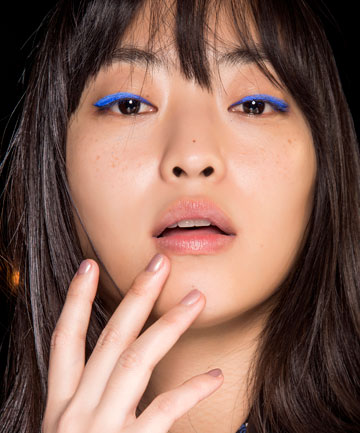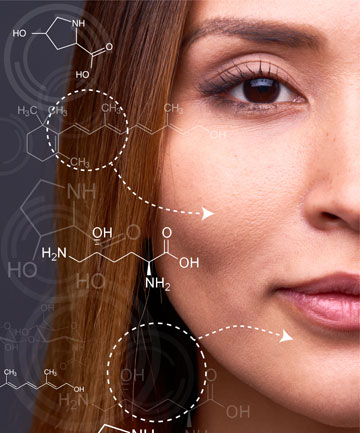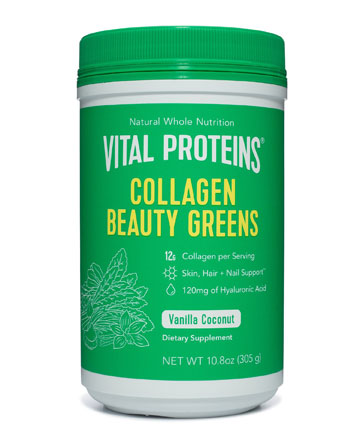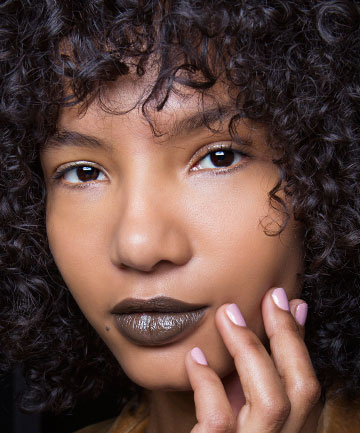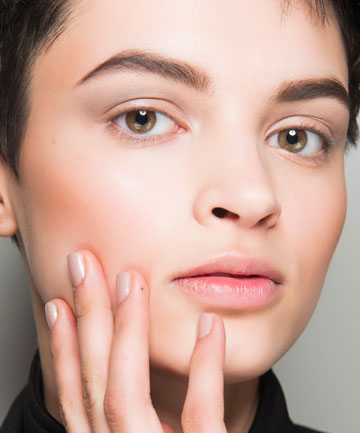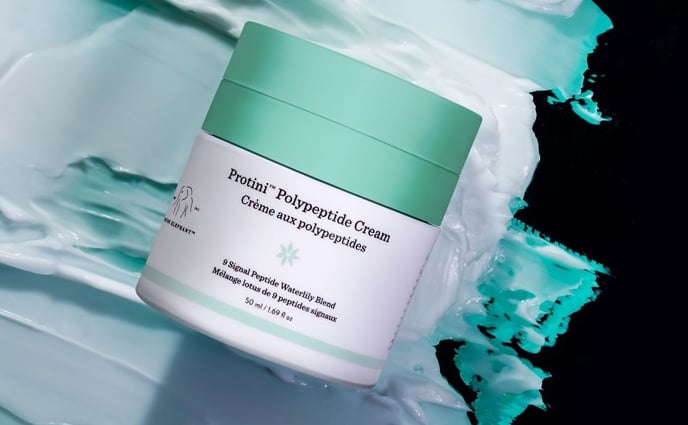Collagen supplements have reached height popularity. The powdery stuff is being mixed into cookie recipes, poured into your morning cuppa and incorporated into daily multivitamins. Even Sephora has jars of collagen supplements stocked on its beauty shelves. Curious about the efficacy of orally ingested collagen, we reached out to dermatologists for some expert guidance on whether it's worth adding to your regimen. Spoiler: current scientific literature points to "meh."
Image via Imaxtree
Image via Imaxtree
Before diving into the merit of collagen supplements, let's first do a refresher. In short, collagen is a structural protein that's found in connective tissue all over the body, including tendons, cartilage and skin.
"In our skin, dermal fibroblast cells continually make collagen and its production is increased when needed, such as during wound healing," says Dr. Jeanette M. Black, a board-certified dermatologist practicing in Beverly Hills. "As we age, we see a decrease of collagen in the skin. The degradation of collagen is amplified by environmental factors such as radiation from the sun."
The loss of collagen in our skin, which really starts to taper around age 30, contributes to signs of aging, such as laxity, thinning skin and the formation of fine lines and wrinkles.
Image via Mediaphotos/Getty
"In our skin, dermal fibroblast cells continually make collagen and its production is increased when needed, such as during wound healing," says Dr. Jeanette M. Black, a board-certified dermatologist practicing in Beverly Hills. "As we age, we see a decrease of collagen in the skin. The degradation of collagen is amplified by environmental factors such as radiation from the sun."
The loss of collagen in our skin, which really starts to taper around age 30, contributes to signs of aging, such as laxity, thinning skin and the formation of fine lines and wrinkles.
Image via Mediaphotos/Getty
According to product claims, the point of orally ingested collagen supplements — AKA hydrolyzed collagen — is to help combat signs of aging related to collagen loss. Each product makes its own claims, ranging from plumper skin and increased elasticity to improved joint and ligament health. The question, though, is whether these products live up to their claims.
Try: Vital Proteins Collagen Beauty Greens, $49
Try: Vital Proteins Collagen Beauty Greens, $49
We asked Dr. Valerie Goldburt, a board-certified dermatologist with Advanced Dermatology PC, if there was any concrete scientific proof that taking collagen supplements improved skin quality.
"No," she said. "Studies show ingesting collagen increases collagen-specific peptides in the bloodstream immediately after, but no one has demonstrated a benefit to the skin."
Black agreed completely, saying, "Orally ingested hydrolyzed collagen is thought to have some antioxidant properties and possible reparative benefits, but there have been no publications in peer-reviewed journal articles with evidenced-based research demonstrating any benefit to the skin."
She also added that it's unclear how ingesting large quantities of collagen may affect us, including whether doing so could have detrimental effects. That's definitely something to think about before scooping powder into your daily protein drink.
Image via Imaxtree
"No," she said. "Studies show ingesting collagen increases collagen-specific peptides in the bloodstream immediately after, but no one has demonstrated a benefit to the skin."
Black agreed completely, saying, "Orally ingested hydrolyzed collagen is thought to have some antioxidant properties and possible reparative benefits, but there have been no publications in peer-reviewed journal articles with evidenced-based research demonstrating any benefit to the skin."
She also added that it's unclear how ingesting large quantities of collagen may affect us, including whether doing so could have detrimental effects. That's definitely something to think about before scooping powder into your daily protein drink.
Image via Imaxtree
By now you've probably surmised that collagen supplements aren't a necessary — or even recommended — part of your skin care regimen. Fortunately, you've got a number of alternatives.
"To increase the skin's collagen, it seems that it is most beneficial to aim to stop collagen degradation and work to increase the body's own production of collagen rather than attempting to consume animal-based collagen," says Black. "The best way to stop collagen degradation is to wear a daily sunblock with an SPF of 30 or higher to protect it from the sun's harmful radiation."
She adds that a healthy diet also plays a pivotal role in our overall health and, therefore, the appearance of our skin. Specifically, a diet rich in antioxidants and low in processed foods may help the skin to repair the oxidative damage from the environment such as the sun's radiation.
For a more aggressive approach, Goldburt also recommends laser treatments, which actually have been scientifically proven to stimulate collagen production in the skin. Microneedle and PRP treatments, when performed correctly, have been proven effective, as well.
In addition to the above, consistent application of topical vitamin A (retinoids) can repair and prevent signs of aging. Not only is there a mountain of research backing up topical usage of vitamin A, you'll be hard-pressed to find a dermatologist who doesn't regularly apply it themselves.
Image via Imaxtree
"To increase the skin's collagen, it seems that it is most beneficial to aim to stop collagen degradation and work to increase the body's own production of collagen rather than attempting to consume animal-based collagen," says Black. "The best way to stop collagen degradation is to wear a daily sunblock with an SPF of 30 or higher to protect it from the sun's harmful radiation."
She adds that a healthy diet also plays a pivotal role in our overall health and, therefore, the appearance of our skin. Specifically, a diet rich in antioxidants and low in processed foods may help the skin to repair the oxidative damage from the environment such as the sun's radiation.
For a more aggressive approach, Goldburt also recommends laser treatments, which actually have been scientifically proven to stimulate collagen production in the skin. Microneedle and PRP treatments, when performed correctly, have been proven effective, as well.
In addition to the above, consistent application of topical vitamin A (retinoids) can repair and prevent signs of aging. Not only is there a mountain of research backing up topical usage of vitamin A, you'll be hard-pressed to find a dermatologist who doesn't regularly apply it themselves.
Image via Imaxtree


